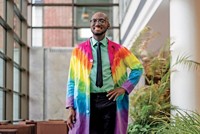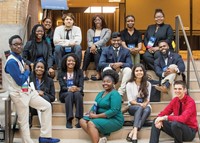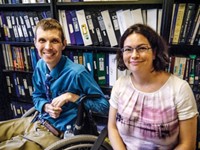Advertisement
Grab your lab coat. Let's get started
Welcome!
Welcome!
Create an account below to get 6 C&EN articles per month, receive newsletters and more - all free.
It seems this is your first time logging in online. Please enter the following information to continue.
As an ACS member you automatically get access to this site. All we need is few more details to create your reading experience.
Not you? Sign in with a different account.
Not you? Sign in with a different account.
ERROR 1
ERROR 1
ERROR 2
ERROR 2
ERROR 2
ERROR 2
ERROR 2
Password and Confirm password must match.
If you have an ACS member number, please enter it here so we can link this account to your membership. (optional)
ERROR 2
ACS values your privacy. By submitting your information, you are gaining access to C&EN and subscribing to our weekly newsletter. We use the information you provide to make your reading experience better, and we will never sell your data to third party members.
Education
Newscripts
Quidditch For Chemists
by Lauren K. Wolf
June 29, 2009
| A version of this story appeared in
Volume 87, Issue 26

Players wearing capes whip by on broomsticks. With one hand on broomstick, the other free to toss a white ball back and forth, they try to earn points for their teams by zinging the ball through one of three hoops defended by a "keeper" on either end of the field.
"Harry Potter" fans everywhere will undoubtedly enjoy a scene like this one in the film series' latest installment, "Harry Potter and the Half-Blood Prince," which hits theaters in mid-July. But for college students around the country, that scene, featuring the initially fictional game of quidditch, will once again become a reality in the fall, when classes resume.
Started in 2005 at Middlebury College, in Vermont, Quidditch for Muggles (nonmagical folk, for those unfamiliar with "Harry Potter" lore) is the brainchild of then-undergraduates Xander Manshel and Alex Benepe. Unable to work out the logistics of broomstick flight, the pair adapted the high-flying fantasy sport for play on the ground. Today, Quidditch for Muggles—a combination of rugby, basketball, and flag football, played astride a broomstick—is so popular that it is played at more than 100 U.S. universities and colleges.
Young as it is, the Intercollegiate Quidditch Association (IQA) has already attracted a wide range of devotees, many of them budding scientists. "There certainly are a number of science majors" in the quidditch population at Middlebury, says Rainey Johnson, a former member of the school's quidditch group and recent recipient of a bachelor's degree in chemistry. Quidditch "brings together an eclectic crew of nerdy scientists, athletes, and bookworms," he says.

Johnson has the distinction of being the first human "snitch." In Harry Potter's world, the snitch is a hyperactive golden ball with wings, and it is the job of a team's "seeker" to catch the speedy object to end the match. Because Johnson was a cross-country runner and friend to Manshel and Benepe, he was recruited to literally embody the snitch. Dressed all in yellow and carrying the trophy—a tennis-ball-loaded sock attached to his waist—he ran around the campus and quidditch field during each match until one team's seeker managed to capture the sock, like the flag in flag football.
But Quidditch for Muggles doesn't just attract young science students as fans. Some professors get drawn in, too.
In October 2008, Middlebury hosted the Intercollegiate World Cup, a 12-team tournament at which Jeffrey H. Byers, a Middlebury chemistry professor, played the part of the wizardly potions teacher and put on a chemistry show. Known for making "Harry Potter" references and sometimes causing "spectacular explosions" during his lectures, Byers admits that "it was known I would be a person amenable to this sort of thing."
So IQA beckoned, and Byers donned his faculty gown and dazzled the crowd. During his half-time show, Byers says, he blew hydrogen into soap bubbles; as they floated about, he ignited them with a candle. In another display, he filled rubber gloves with acetylene and lit the fingertips. "It makes a flaming jet into the air," Byers explains.
"It was a riot," says Justin Bogart, a senior Middlebury quidditch player who also majors in chemistry. With this kind of participation, "quidditch will surely continue to spread throughout campuses across the nation," he adds.
And with so many young, innovative scientists becoming quidditch enthusiasts, maybe someday Quidditch for Muggles can overcome its biggest obstacle: gravity. "The science of learning how to fly on brooms," Johnson says, "if we could figure that out, that would be really good."
Lauren K. Wolf wrote this week's column. Please send comments and suggestions to newscripts@acs.org.





Join the conversation
Contact the reporter
Submit a Letter to the Editor for publication
Engage with us on Twitter